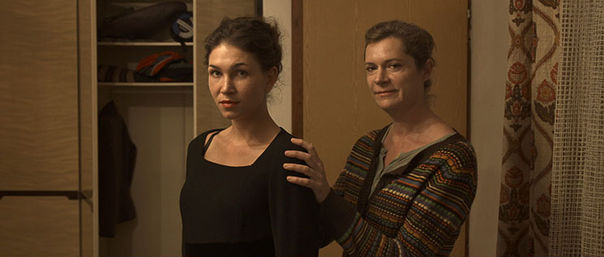No Rest for the Wicked
Daniel Mandić of the 2013 Talent Press Sarajevo reviews Daniel Hoesl's debut SOLDATE JEANETTE.

Daniel Hoesl's SOLDATE JEANETTE
SOLDATE JEANETTE is a drama about two women's spiritual rebellion against the material world: Fanny escapes from a city to countryside, while Anna does the opposite.
Fanny, masterfully played by Johanna Orsini-Rosenberg, is a mature member of the upper-middle class who, for the first half of the film, seems absolutely indifferent in her efforts to financially destroy herself. Rushing from one illegal loan to another she eventually leaves the city, and in the scene where she camps in mountains, she burns a large stack of bills, shocking the unsuspecting viewer as her oddly peaceful face reveals that this is a fully staged bankruptcy plot – the motives of which remain unclear until the end of the film.
At this point, the story brutally switches and introduces the extremely naturalistic life of Anna (Christina Reichsthaler), a young woman who works on a farm. Sleeping with a rough man whose father owns the farm, and being unable to neither confront nor resist him, thus failing to earn his respect, she is close to despair, set against her harsh everyday routine – until Fanny takes her under her protection. And labour for one is entertainment for the other! Without any of the restraints of the material world, Fanny encourages Anna to escape.
SOLDATE JEANETTE is a strongly motivational story. Satirical while depicting fashionable city life, the film also demystifies popular opinions about the satisfaction that life in countryside offers, promoting an idea of freedom outside the borders of any social or conformist structure. Although escape is practically impossible, the film leaves its ending open. Despite hinting that Fanny's chances to leave are limited, it’s convincing in communicating that whatever happens in the future, she will remain free in spirit, determined not to obey the enforced laws.
Young director Daniel Hoesl refuses to paint society through the usual clichés of alienation that might have forced Fanny to turn her back on it, but rather represents it through the supportive characters that appear willing to give Fanny a hand. By refusing their help, she only highlights her personal attitude towards this kind of society, showing the need to get away even more strongly. At the same time, the countryside seen through Anna’s eyes is far less idyllic.
However, aside from beautiful cinematography of Gerald Kerkletz and Natalie Schwager’s solid editing, the author of Soldate Jeannette could have put more effort into solving the substance, rather than the form; the expression is much stronger than its characters and narrative line. A wide range of music – from aggressive techno to soft jazz – underlines the anarchistic message of freedom and revolt – though the story itself leaves no doubt regarding its intentions.

